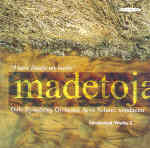This lovely disc makes the perfect introduction to Leevi Madetoja’s mature sound world. The two sets of excerpts from his operas, the works on which his reputation largely rests today, give a good sense of their native tunefulness and telling use of a somewhat austere orchestral palette. But the big event is the superb recording of the lyrical Second Symphony, one of the great ones in the Finnish repertoire and fully comparable to the contemporaneous works of Sibelius (it dates from 1918). Structurally it’s quite interesting: a pastoral opening movement (shades of Sibelius 2!) leads to a lengthy Andante, followed by a turbulent Allegro third movement (the symphony’s most highly developed section) and closing with a brief, calm epilog. That quiet ending, of course, accounts for the work’s comparative neglect since by any criterion this is a major statement and an extremely attractive exercise in late Romantic nationalism. Arvo Volmer lavishes great care on these performances, and the Oulu Symphony plays with genuine skill, sympathy, and warmth. Excellent sound rounds out an enticing package.
































